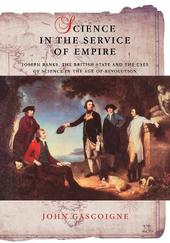
|
Science in the Service of Empire: Joseph Banks, the British State and the Uses of Science in the Age of Revolution
Paperback / softback
Main Details
| Title |
Science in the Service of Empire: Joseph Banks, the British State and the Uses of Science in the Age of Revolution
|
| Authors and Contributors |
By (author) John Gascoigne
|
| Physical Properties |
| Format:Paperback / softback | | Pages:256 | | Dimensions(mm): Height 254,Width 178 |
|
| Category/Genre | British and Irish History
Impact of science and technology on society
History of science |
|---|
| ISBN/Barcode |
9780521181365
|
| Classifications | Dewey:303.4830941 |
|---|
| Audience | | Professional & Vocational | |
|---|
| Illustrations |
Worked examples or Exercises
|
|
Publishing Details |
| Publisher |
Cambridge University Press
|
| Imprint |
Cambridge University Press
|
| Publication Date |
17 February 2011 |
| Publication Country |
United Kingdom
|
Description
Joseph Banks is one of the most significant figures of the English Enlightenment. This book places his work in promoting 'imperial science', in the context of the consolidation of the British State during a time of extraordinary upheaval. The American, French and Industrial Revolutions unleashed intense and dramatic change, placing growing pressure on the British state and increasing its need for expert advice on scientific matters. This was largely provided by Banks, who used his personal networks and systems of patronage to integrate scientific concerns with the complex machinery of government. In this book, originally published in 1998, Gascoigne skilfully draws out the rich detail of Banks' life within the broader political framework, and shows how imperial concerns prompted interest in the possible uses of science for economic and strategic gain. This is an important examination of the British State during a time of change and upheaval.
ReviewsReview of the hardback: '... richly detailed. As an insight into the struggles between free trade and protectionism, and into the colonial mentality ... It will find an appreciative audience among students of the British enlightenment.' Michael Cathcart, Australian Book Review
|